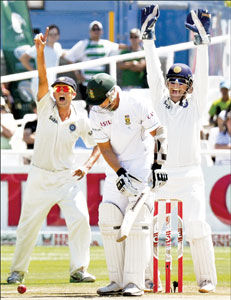|
In a league of his own:
Why India refuses to accept UDRS?
Keshava D Guha
In the history of professional sport, equality before the law is at
best a tenuous concept. Star players and champion teams in most sports
have come to expect anything from leeway to outright preference from
umpires and referees. LeBron James, the world's most talented basketball
player, is routinely allowed to take four or five steps with the ball
without being called for a travelling violation. Real Madrid's Cristiano
Ronaldo persistently wins fouls for outright dives and play-acting.
Profit-minded administrators, PR executives and sponsors have crafted an
environment in which fans often identify with individuals rather than a
team.
 In cricket, the notion that the right of a star player to perform his
art ought to take precedence over fair application of the rules has over
a century of precedent. Most famously, the first cricketing superstar WG
Grace refused to depart when dismissed, informing the umpire that the
spectators had come to "watch me bat, not to watch you umpire". More
recently, Shivnarine Chanderpaul spoke for many of his fellow players
when he claimed that the great Australian team benefited from 80% of
50-50 umpiring decisions. In cricket, the notion that the right of a star player to perform his
art ought to take precedence over fair application of the rules has over
a century of precedent. Most famously, the first cricketing superstar WG
Grace refused to depart when dismissed, informing the umpire that the
spectators had come to "watch me bat, not to watch you umpire". More
recently, Shivnarine Chanderpaul spoke for many of his fellow players
when he claimed that the great Australian team benefited from 80% of
50-50 umpiring decisions.
Preferential treatment is detested by everyone other than the players
involved and their supporters. Advancements in video technology have
emerged as a powerful force for fair and equal enforcement of rules.
Since 1992, cricket benefited greatly from the application of
technology.
Replay for run-outs, ball-tracking for LBWs and infrared imaging for
edges have added to the umpires' toolkit, culminating in the present
Umpire Decision Review System (UDRS). Every study of the UDRS has found
that it significantly improves decision-making accuracy.
Yet the Indian cricket team's persistent refusal to accept UDRS has
prevented the system from achieving universal acceptance. Given India's
hegemonic position in world cricket's administration, it could take
several years until the system becomes standard.
While most fans and journalists tend to blame the Board of Control
for Cricket in India (BCCI) for its opposition to UDRS, it is now clear
that the driving force behind this opposition is Sachin Tendulkar, the
WG Grace of today. Just as paying spectators went to watch Grace play
cricket in the 1890s, today's Indian fans attend matches to watch the
player they have come to refer to as 'God'. While Tendulkar's genius is
above question, his stature in the game has ensured that for much of his
career, he received a greater benefit of doubt in marginal decisions
than other cricketers. Additionally, as a relatively short batsman, he
is often reprieved in close LBW situations.
Tendulkar's official explanation of his opposition to UDRS is that he
only approves of the system when it includes Hot Spot, the infrared
imaging technology. Yet he, along with MS Dhoni and other senior
players, has now vetoed UDRS for India's upcoming tour of England -
where Hot Spot would have been used. In this context, his opposition to
UDRS is an opposition to more accurate decision-making in cricket.
In the US, with its obsessively star-driven sporting culture,
Tendulkar would be lauded by journalists for earning the "respect of
umpires". But with the rest of the global cricketing community
clamouring for greater fairness through UDRS, his continued opposition
merits comparison to Grace and Don Bradman, two great batsmen notorious
for putting self-interest above the interests of cricket as a whole.
Conversely, if Tendulkar changes his mind, the BCCI is sure to accept
UDRS, and thus go some way in convincing other ICC members that India's
dominance of world cricket is no despotism.
Hindustan Times
|





